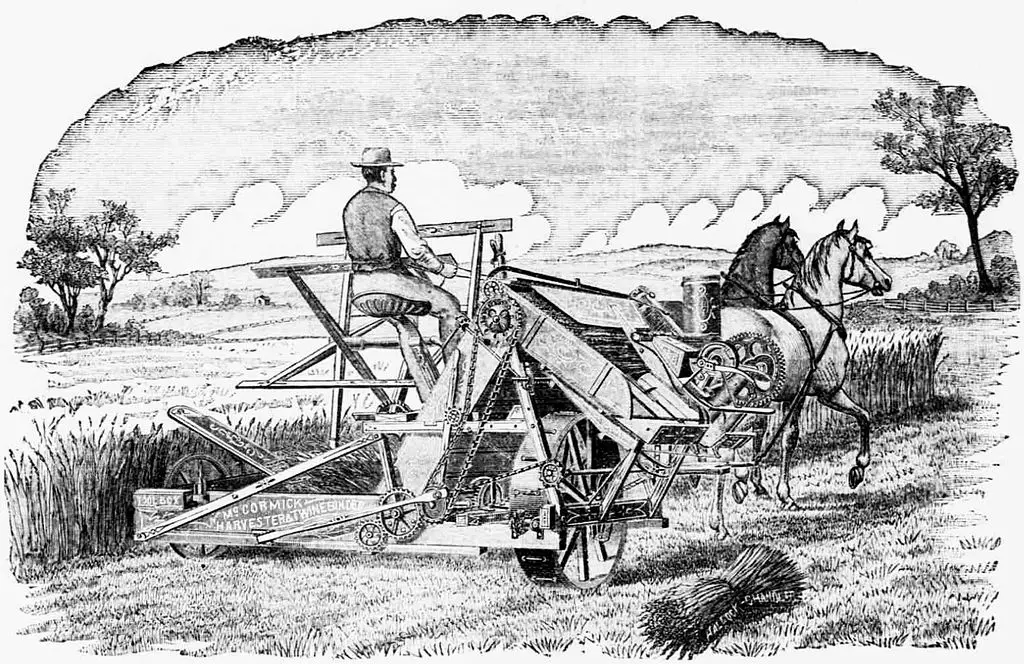Pioneer Jobs
The early pioneers that set out to the new land areas were mainly farmers. This was a requirement for their own survival. However, there were other jobs that were necessary that included carpenters, hunters, loggers, and trappers. The land that they were settling in was empty, and they had to rely on themselves and their neighbors to carve out a new life.

- As pioneer communities grew, they moved from having the most basic of existence to gaining extra members that had specialized abilities. These occupations were slow to appear but included people that were traders, druggists, salesmen of equipment, and carpenters.
- The life of a pioneer involved a lot of hard work, and each member of the family often worked from dawn until dusk. They had a responsibility to build a home and barns and farming the land so they could eat.
- Everyone in the family had their own specific jobs or chores. For women, they were often in the fields helping during both harvesting and planting times. However, they were also responsible for making and mending all of the clothes for the family, making soap and candles, spinning flax into thread and wool into yarn, caring or the children, making quilts and inside bedding, cooking, and keeping the inside of the home clean.
- Children began working as soon as they were old enough to help. This was often at the age of 5-6 years. Their chores involved getting fresh water, monitoring the fire so it didn’t go out, keeping the cows and the chickens in their place, so they didn’t wander off and eat the crop they had planted, milking cows, and churning the cream that they got from the cows into butter. As children got older, the girls would help to take care of their younger brothers and sisters, and boys would help to chop wood or by working in the fields.
- Pioneers had to depend on help from their neighbors, and since they were often miles apart, they would gather to help build houses and barns for each other. Many of the pioneers were immigrants and brought their own trades and talents from the countries they had left. Caring for horses, blacksmithing, and carpentry were highly valued trades.
- The Native Americans taught the pioneers a lot about using local herbs for medicines and the ways they needed to plant crops in their area. As the pioneers didn’t have indoor plumbing, they had to construct outhouses as bathrooms. The Native Americans taught them to use dried cornhusks and leaves for toilet paper.
- As communities became more populated, they built churches and schools. Towns started seeing the addition of specialty shops such as barbershops where the barber acted as the town doctor. Other small shops opened up to offer whatever supplies they could stock for the community.
- The biggest change in jobs happened when the railway was completed. This opened up an incredible number of requirements since towns were now getting and sending products faster, and they were growing. New towns were being added along the train route, and this brought an improved economy. Suddenly farming communities were seeing the addition of doctors, saloons, and even banks crop up. As the smaller pioneer towns became larger communities, they saw an increase in some of the services, shops, and professions.
- Those that did very well with their farming now had the opportunity to improve on their existing homes or just build new ones. Log cabins changed into nicer styles homes, and they used the carpenters and stonemasons that were now arriving in their towns.
Q&A:
What was the main job of the early pioneers?
Farming
What were some of the other necessary professions needed by the early pioneers?
Carpenters, hunters, loggers, and trappers
What caused the biggest change in pioneer life?
The railway system/railroad
As pioneer communities grew, what were some of the jobs that began to show up in their towns?
Traders, druggists, salesmen of equipment, and carpenters.
What were some of the jobs of the younger children on a pioneer farm?
Getting fresh water, monitoring the fire so that it didn’t go out, keeping the cows and the chickens in their place so they didn’t wander off and eat the crop that they had planted, milking cows, and churning the cream that they got from the cows into butter
What were some of the jobs of the women on a pioneer farm?
Working in the fields, making and mending all of the clothes for the family, making soap and candles, spinning flax into thread and wool into yarn, caring or the children, making quilts and inside bedding, cooking, and keeping the inside of the home clean



